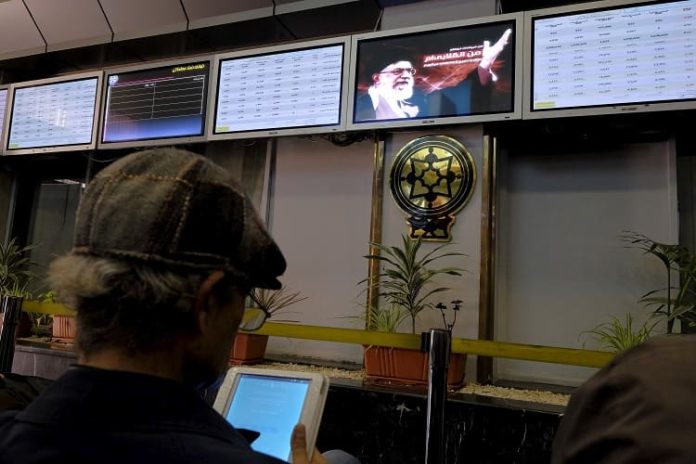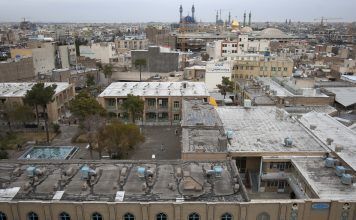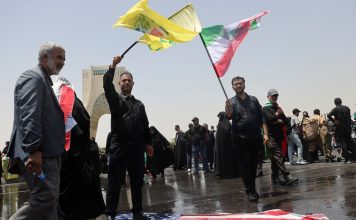
By Kayhan Life Staff
Nearly $144 million in cash investments in stocks were withdrawn from Tehran Stock Exchange (TSE) on May 7 and 8, Eghtesad-24 online newspaper reported.
(The conversions are based on the current exchange rate of 53,600 tomans to a U.S. dollar.)
The Tehran Stock Market Index, TEDPIX, dropped 125,761 points to 2.314 million on May 8.
The TSE Securities Index dropped 37,000 points to 803,000 on the same day.
On May 8, the TSE experienced a record drop of 200,000 points (a combination of assets or types of assets packaged together and sold as one.)
Except for 56 companies, all other stocks on May 8 traded lower than the previous day’s close.
Retail investors reportedly withdrew $88 million from the stock market on May 7, the most funds taken out of the market since September 2020.
TEDPIX dropped 95,000 points between May 7 and 8.
While some people believe the market is affected by rumors, others argue that news about efforts to lower the foreign exchange rate has caused the current volatility in the market.
The government is reportedly taking measures to calm the stock market.
Speaking to Eghtesad-24 newspaper about the high risk of trading stocks, Abuzar Mashayekhi, a market analyst, said: “Most people must avoid a major loss by investing up to around 30 percent of their cash assets in the stock market. It is a high-risk market. There are other less risky markets to invest rials in.”
“There are several reasons for cash investment leaving the [stock] market, including contradictory news about the foreign exchange rate and the JCPOA [the 2015 Joint Comprehensive Plan of Action, or Iran nuclear deal,]” Mr. Mashayekhi explained.
“Also, investors seek more secure markets such as cars, real estate, and gold, or take their money out of the country. These are not new activities and have occurred in recent years. These parallel markets are connected,” Mashayekhi noted.
[aesop_image img=”https://kayhanlife.com/wp-content/uploads/2018/10/TSE-604985.jpg” panorama=”off” credit=”Iranian shareholders look at electronic display boards in Tehran’s Stock Exchange, Iran. REUTERS/FILE PHOTO” align=”center” lightbox=”on” captionsrc=”custom” captionposition=”left” revealfx=”off” overlay_revealfx=”off”]
According to the Borna news agency, the half-yearly financial reports of most companies showed a massive drop in their share values, resulting in a negative TEDPIX.
The report included comments from experts who said the share value of several companies in the stock market did not correspond to their assets.
The Iranian rial has regained some of its recent loss against foreign currencies in the past week, causing a drop of 5 percent in TEDPIX and prompting some investors to take their money out of the stock market.
Meanwhile, the price of goods, especially food products and services, continues to rise in Iran, forcing the government to take desperate measures to control the inflation rate and the housing market.
INTERVIEW: Economist Hassan Mansoor Analyzes Iran’s ‘Productivity Plan’
Prices of eggs, bread, tuna, grains, fruits, and unpasteurized milk have risen recently. There has also been a ticket shortage for domestic flights.
After much delay, the Statistical Center of Iran (SCI) published its report that said the annual inflation rate for the entire country was 45.8 percent in February — with 45 percent in cities and 50.6 percent in rural regions.
The data showed that people living in smaller towns and villages faced more significant economic challenges than those in big cities.
The report added that the monthly inflation rate stood at 4.7 percent in February and 3.7 percent in April. The inflation rate for food products reached 6.9 percent in February.
Writing about the late release of SCI’s report on the rising inflation, the Khorasan newspaper said: “SCI finally published its report on the inflation rate after a 40-day delay, but the data is brief and incomplete.”
“The delay was caused by changing the ‘base period’ from 2016 to 2021, which should not have been a reason for the late release of the data,” the paper argued.
“Current government, which criticized the former administration for stopping the release of the annual inflation rate by the [Islamic Republic of Iran] Central Bank in 2018, has not released the data yet,” the paper noted.
“Besides the lack of information about inflation, no data on housing prices in Tehran has been published yet,” the report explained.
“The Central Bank and SCI have not published their daily and monthly reports since Jan. 1 and Feb. 5. The delay shows a reluctance or even fear of publishing the data,” it added.
Mohammad Reza Rezaei Kouchi, the chair of the Majlis (Iranian Parliament) Civil Commission, has criticized withholding data on the inflation rate in April.
“The government must explain why it has not published the data on the inflation rate in April. It was not a good move,” Mr. Kouchi said. “The rising housing prices stop people from thinking about the past.”
“Housing prices increase because no more homes are being built. No one dares to publish the cost of housing because of the rising sale prices,” Kouchi added.
ANALYSIS-Frustrated Khamenei Pushed for Saudi-Iran Deal Clinched in China
Housing prices and cost of living are not the only markets impacted by the rising inflation rates.
With the start of the moving season, the prices of rental apartments also soared.
Almost half of the country’s population lives in rental housing. They face dire economic circumstances, given that their salaries and wages cannot keep up with the rising monthly rents and cost of living.
While some families are forced to live together in an apartment, others sleep in parks or bus stations.
Instead of finding a comprehensive and workable solution to the housing market, the government has blamed property “flippers” (wholesale real estate investors) for the rising cost of homes and rental units.
To stabilize the housing market, the government of President Ebrahim Raisi has submitted a “double [fast-track] urgent bill” to the Majlis titled “Taxing Multiple Sale of Residential Units” to prevent the “flipping” of residential properties.
If passed, the bill will enable the government to collect up to 60 percent of the profit in taxes if a residential unit is sold within one year of its purchase.
Experts believe the proposal will fail like all other “policing” measures to tackle the country’s economic crisis.
They argue that housing is a commodity in the Iranian economy, affected directly by the foreign exchange rate, inflation, and other relevant factors.







